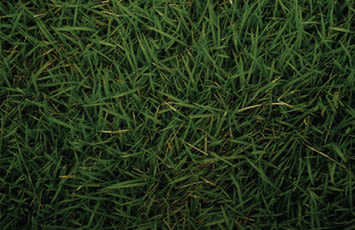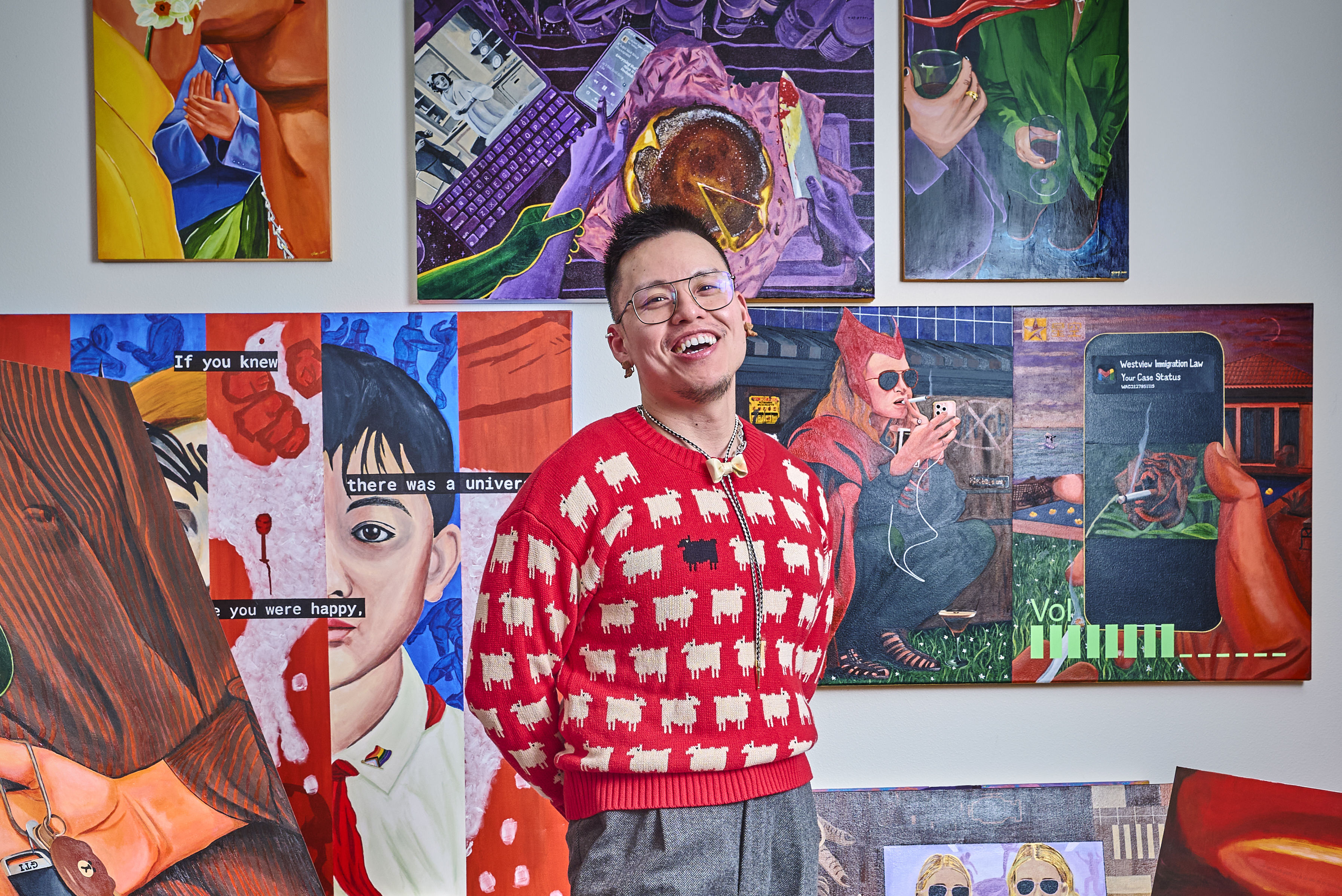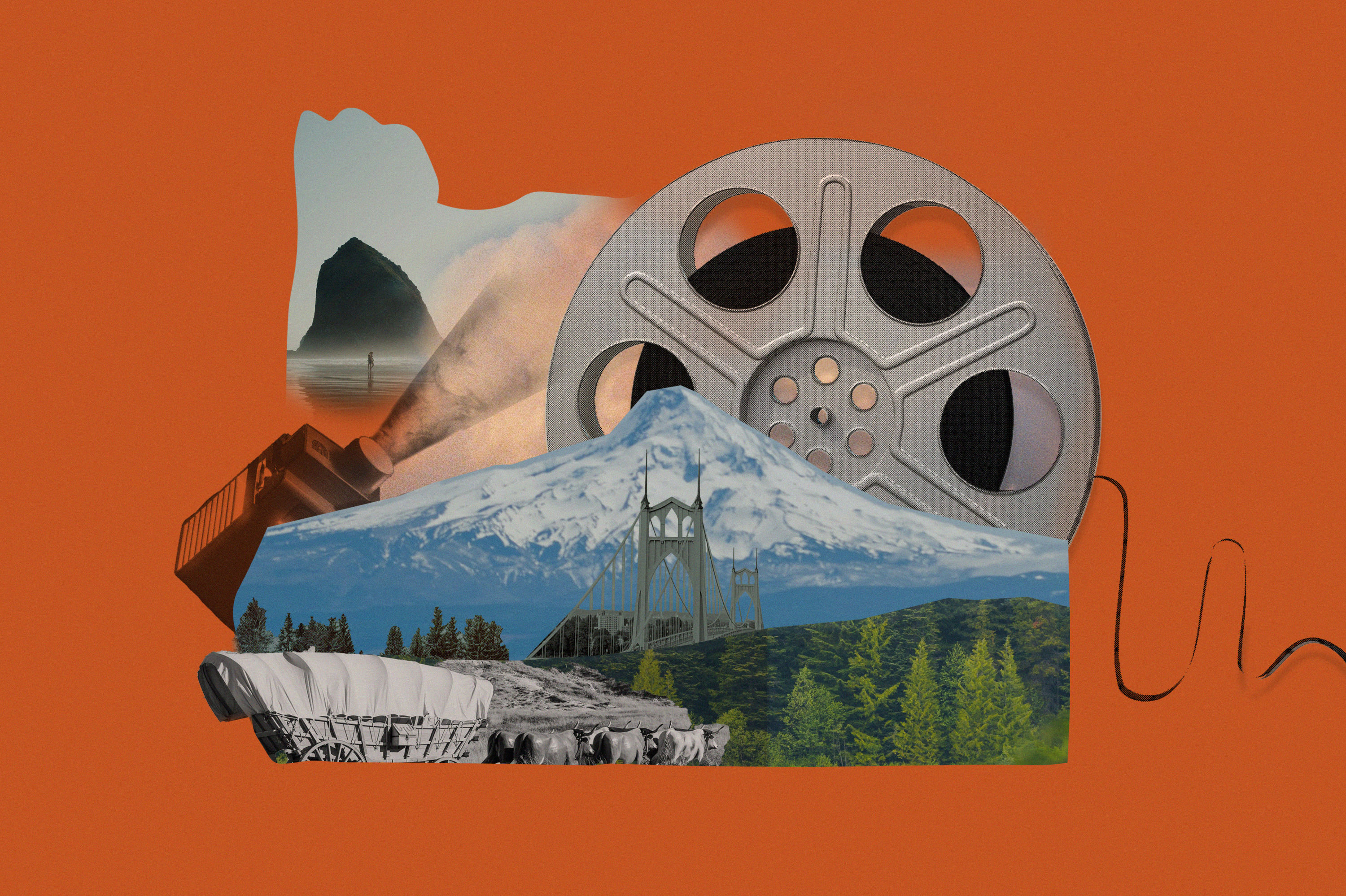Grass At My Feet

I WAS STILL HEARING GREAT-GRANDPA’S VOICE. GRANDMA AND I WERE SITTING ON THE GRAY PORCH, THOUGH IT ONLY MADE US THINK OF DYING.
“Grass under my head,” he’d said. “When I was a boy, grass at my feet, grass in my hands. The baking, prairie-smell inside,” he’d said.
There was nothing but grass in the yard to look at, and grass on the other side of the low fence, and farther than we could see.
“It was sure quiet when I was a girl. Hardly any folks came by.”
“That’s the same as it is now, Grandma.”
“Things don’t change much, outside of telephones, and plumbing,” she said.
“And people,” I added.
“No. Not people.”
“Yes they do. They die,” I said. “That’s not changing.”
We weren’t changing anyway. The two of us had looked the same our whole lives. If you painted garnet earrings into my grandmother’s baby picture it would look just like she does now.
My grandma doesn’t understand exaggeration, and doesn’t use it either. That’s why the summer I was 17, as soon as she picked me up at the train station in Sidney I knew something was wrong. She wore her yellow-and-brown-checkered housedress and didn’t say a word. When she hugged me I felt the bones of her wrists press against my spine. We climbed into her green pickup, and she waited until we’d crossed over the border into North Dakota before she would speak. Grandma doesn’t like discussing important matters out of state, although half her cousins live in Montana.
“Your great-grandfather sat down on the porch four days ago and hasn’t moved or eaten since,” she told me.
I watched her brownish lips pause before saying four, hesitating to make sure she was correct. I didn’t ask a lot of questions. I just looked out the clean windows of her pickup, out and out, and every once in a while I saw a low house behind a windbreak, or some dusty cows huddled in a heap like one of my brother’s chummy sports teams.
When we walked around the house to the backyard porch I saw my great-grandpa still as a museum mannequin on the blue paint-chipped chair, one hand on each whitened knee of his jeans. He had all his hair; it was so dark it looked nearly black. He never spent a whole day indoors, and the skin of his face was tan and red. He was Norwegian, but people around Skar called him Chief. Under his sleeve, the skin of his shoulder was as white as an oyster shell. Great-grandpa didn’t twitch or budge when Grandma and I walked up the porch steps, but I trailed my fingertips against the back of his hand when I walked by, to see if he’d notice. His thumb lifted and lowered back down to its place on his leg.
“Come on in, Claire,” Grandma called from the kitchen.
When Grandma and I sat down to eat I allowed myself one of the questions I’d denied before: “Why’s he sitting out there?”
Grandma stared over the jug of whole milk between us on the small, round table.
“It’s where he set himself,” she said.
I looked toward the screen door that opened onto the porch. The whole world outside was deep blue. Blue air, blue fence, blue grass, and if I could have seen him, a blue Great-grandpa.
“Should I take him a biscuit?” I asked.
“No,” she said. “He knows what he wants.”
By that summer I had my own room, but when it came time for sleep Grandma said I should get in with her. I carried my suitcase and laid it on the wooden floor by her bed. I’d undressed before her so many times I didn’t even wonder if she was looking when I pulled my T-shirt off and stepped out of my jeans. My whole family used to visit in the summer before my big brothers got jobs and girlfriends, before my mother started sending me alone, saying, “You should help take care of things,” which meant letting Grandma take care of me. Back then Grandma gave us new clothes she’d been making all year. Mom would measure my brothers and me in the kitchen in Washington, all the while on the telephone with Grandma in North Dakota, who’d be writing John, Carl, Claire on a slip of paper, recording the shapes of our bodies in numbers beneath our names. My grandma could recite the circumference of my bust, hips, and neck, and the length of my arms and legs the way God is supposed to know the number of hairs on my head. She sewed dresses for me, and aprons of sturdy, cotton cloth. These were my summer clothes. At first I didn’t like them, but Great-grandpa said how nice I looked, and once when I wore a blue dress the color of the veins under his wrists, he looked at me and said, “Set your pretty feet down.” He’d never said pretty when I was wearing jeans.
After undressing, Grandma and I pulled the white and brown quilt up to our bellies and stared toward the dark ceiling.
“I don’t want death finding you alone in the house. You’ll sleep with me until your great-grandfather passes,” she said.
I listened to the awake sounds her breathing made until she fell asleep. It was late when I snuck out to the porch, and I could see the stars as they never show at home. I walked right past Great-grandpa without looking at him and sat on the second porch step. Settled on the stair, I heard his voice, slow utterances to soothe a spooked animal or child.
“Grass under my head, the hoof of the white horse beside me. When I was a boy, dry grass at my feet. A cool creek hidden. Grass in my hands at the horse’s muzzle, water on my lips. At home the brown smell of baking, and prairie wind in through the window. In the evenings, grass under my head.”
His voice opened mine. With my back to him I told him something secret. And I knew by the way his breathing quieted while I spoke that he was listening, and had heard.
“You never knew that, did you,” I said and stood up, slipped back in through the screen door quieter than hair slips from a head.
I followed Grandma out to the barn in the morning. We fed Old Bruce, the only horse she still kept. Old Bruce was an Appaloosa with long lashes. There were hollows above his eyes and he liked to lean his forehead against ours. I stood there, in the dusty air, my forehead against the wide bone of his face, and we breathed into each other’s noses. Great-grandpa had taught me to do that when I was small. “Let him learn your smell,” he’d said, and I’d stepped up onto the first rung of the fence to reach him. Old Bruce had smelled of chewed grass. I smelled of apples and bread. “He knows you now,” he’d said. After that I began to crawl onto Great-grandpa’s lap in the evenings to learn his smell, my white, freckled forehead against his dark one. Soon I grew too old for this. I became aware of what this sort of intimacy means between others. I stopped, though I didn’t want to, and settled for breathing into Old Bruce.
“Great-grandpa’s not sleeping,” I told Grandma. “I looked in on him last night.”
Old Bruce let out a deep huff, and Grandma thumped a Bible against her thigh. She’d taken to carrying it since Great-grandpa moved out to the porch. We let Old Bruce into the corral to stretch his legs, and headed back to the house. We didn’t know what to do. Great-grandpa was taking up all the space with his stillness. His resolution was inescapable; it spread into the house and yard as completely as grass spread over the prairie.
Later, when Grandma went down to the cellar to cool off, or maybe to escape the weight of Great-grandpa’s persistence, he called to me from the porch. I left the sink and went to him directly. He looked at me as though he didn’t know what I was doing there. He stared at the dishwater dripping from my hands while my ears pulsed with the sounding of my name.
“I come when I’m called,” I explained.
“I’d like to play you some music,” he said.
I made my way down the hall and knelt down to reach the fiddle from under the bureau in his tiny bedroom. I came back to him and laid it on his lap. I stood by, but soon saw he wouldn’t make a move to even open the case until I left him. Moments later, my hands back in the dishwater, the first tight strains of his bow stretching over the strings sifted to me through the bent-up screen door. I listened, pushed my hands down into the water, let the water push them back up until there were no suds left. I crept away from the sink and rested my cheek and side against the door frame. To my left I saw Great-grandpa’s right shoulder urging his arm back and forth, and his arm, speckled, veined, and lean at the wrist, pushed and pulled the bow. I thought he must have been a good lover when he was young.
The fiddle-tune widened across the miles of gray, evening prairie, its song deepening until there were no gasps of air between sound, and I imagined Great-grandpa’s playing as though it were swimming. He never paused, even when he said, “I always knew that, Claire.” He was answering my secret from three nights before when I told him I would’ve been his if he weren’t an old man, and my own great-grandpa. The swimming song he made with the strokes of his arm pulled him deeper down into cool water, and that screen between us was just enough to bar me from reaching to him, to keep me from striding out and pushing my forehead against his.
A long while later Grandma came up from the cellar. She looked at me with her tape-measure eyes and saw what had come to pass. All was as still as it had been for days. The water in the sink didn’t tremble, I didn’t cry, the great-grandfather on the porch neither stood nor fell, but despite Grandma’s best intentions in the dark hours, death had found me alone in the house. It hadn’t finished its work yet, but it had come.




